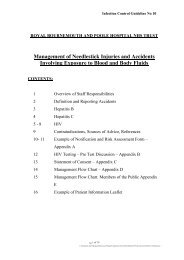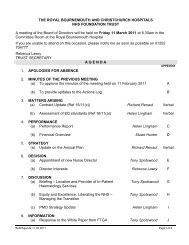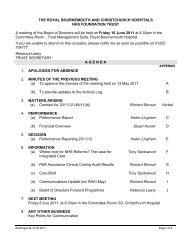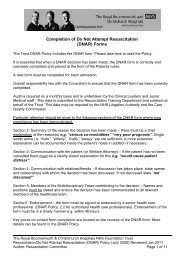A G E N D A 1. APOLOGIES FOR ABSENCE Ian Metcalfe 2 ...
A G E N D A 1. APOLOGIES FOR ABSENCE Ian Metcalfe 2 ...
A G E N D A 1. APOLOGIES FOR ABSENCE Ian Metcalfe 2 ...
You also want an ePaper? Increase the reach of your titles
YUMPU automatically turns print PDFs into web optimized ePapers that Google loves.
5 Decision-making for enforcement cases5.1 IntroductionThis chapter sets out Monitor’s proposed approach to taking three key decisions relevant toformal enforcement:I. the decision to formally investigate a potential breach or infringement;II. the decision to provisionally find a breach and to issue, for example, a ‘Notice of Intent’; andIII. the decision to find a breach and to issue, for example, a ‘final notice’.5.2 The decisions to launch a formal investigation and to make aprovisional findingThe first two decisions relevant to a formal investigation are: whether to formally investigate amatter; and whether to make a provisional finding that there has been a breach or infringement.In both cases, Monitor proposes the decisions are taken by a senior staff member in the Monitorgroup, advised by technical experts as appropriate, responsible for the enforcement action. Thisperson will oversee the investigation up to and including any provisional finding, and takedecisions about whether or not enforcement undertakings should be accepted in relation tobreaches of obligations by providers, or commitments in competition law cases.5.3 The decision to find a breach or infringementFor final decisions concerning a breach or an infringement, Monitor proposes that a decisionmakingcommittee comprising a number of Monitor’s senior staff would take the decision as towhether there has been a breach/infringement, and what sanctions, if any, should be imposed.The membership of the decision-making committee will be decided on a case-by-case basis, tosuit the matter in hand and reflect the risk and complexity involved. It may involve staff from anydiscipline throughout Monitor. Monitor’s Board may decide that it forms the decision-makingcommittee in relation to enforcement matters that are of particular significance to health careservice users. In other cases, Monitor’s Executive team may form the decision-making committee,or it may be made up of other members of Monitor’s senior staff.However the final decision-making committee is composed, the majority of the decision makerson the committee would not have had any significant prior involvement in the investigation – thatis, they would bring a ‘fresh pair of eyes’ to the matter. The senior staff member responsible forPage 40 of 50
















